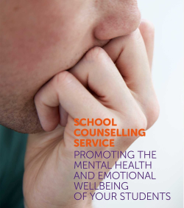Counselling


Young People's Counselling at Grove
The promotion of positive emotional wellbeing for all children and young people is a key function of any school.
Research findings consistently indicate that children and young people experiencing emotional well-being or mental health issues will, in most cases, be best supported by adults who know them well and with whom they feel familiar, comfortable and safe to talk.
The most appropriate way to build a picture about young people’s progress in HWB [health and wellbeing] is primarily through children and young people self-reporting and secondly through observations and one-to-one dialogue between the learner and their guidance teacher, who knows that young person well.

Tips
Resilience in schools is fostered by supportive relationships, including:
- Bonding with individuals
- High expectations with clear and consistent boundaries
- Opportunities to participate and contribute
- Learning social and emotional skills, co-operation, communication and problem-solving skills
- Giving pupils a sense of control over their lives
- Working collaboratively with families
- Extra-curricular activities both within school and in the local community
Tools and Techniques
School staff and parents have key skills and roles to play in both protecting and promoting children and young people’s emotional wellbeing and resilience, and also in identifying, supporting and preventing young people’s mental health difficulties. Many staff and parents already do this extremely well. Regular, planned contact with a Guidance Teacher is likely to be successful in supporting many young people to find their own solutions to overcoming their emotional wellbeing difficulties and developing their resilience to cope with adversity in the future (Noble &McGrath, 2012).
It is important for all school staff to note that strong emotions such as sadness, worry, anger and fear are normal. Recognising them as a normal part of the ups and downs of life, rather than medicalising them into clinical conditions, is critical to building resilience in young people and understanding the mental health continuum. Anxiety, for example, is a normal response to everyday challenging experiences. Through their relationships, knowledge and skills, school staff are well placed to identify young people who may be experiencing difficulties with this type of emotion and provide them with advice and support. However, when these strong emotions begin to have a prolonged negative impact on a young person’s life then it may be necessary to seek support in addition to that available from those closest to them.
Who can help
The value of having a significant, familiar and trusted adult cannot be overestim ated.
ated.
This may be reassuring to school staff who feel they do not have the expertise or time to help young people when they show emotional distress. Pupils can access the School Counselling Service through:
- Self Referral – pupils can complete a self-referral form.
- Guidance Teacher Referral – guidance staff can liaise with the school counsellor.
- Parental Referral – parents are able to make referrals for the School Counselling Service. Details below.
Once a referral is received the school counsellor will make an initial meeting, assess the need and then advise parties of the appropriate next steps.
Referral Forms and Counselling Leaflets can be accessed at the school office or emailed to you. Please contact the school, Grove@dundeeschools.scot , for more information.
There is no legal requirement for the young person’s parents to be informed that they have an appointment with the school counsellor. However, guidelines suggest that before the age of 12, it is unlikely that children will be of sufficient understanding and intelligence and therefore advises that parents should be informed in these cases.
This information can be downloaded as a pdf booklet from this link.

